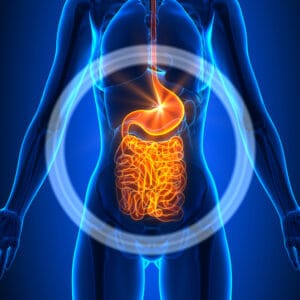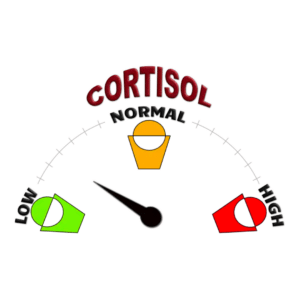AGEs cause skin sagging by damaging collagen and elastin fibres that provide structure and elasticity to the skin. Collagen and elastin are proteins that give the skin its firmness and elasticity and help to keep the skin smooth and wrinkle-free. However, as we age, collagen and elastin fibres are gradually broken down by enzymes in the body, and the formation of AGEs accelerates this process.
AGEs form when sugar molecules bind to proteins or lipids in the body, and this process is called glycation. When AGEs form, they create cross-links between the collagen and elastin fibres, which makes them stiff and inflexible. This leads to a loss of elasticity and firmness in the skin and causes the skin to sag and wrinkle (1).
In addition to damaging collagen and elastin, AGEs also contribute to chronic inflammation in the skin. This chronic inflammation can further damage the skin and accelerate the ageing process. AGEs can also lead to the formation of free radicals, which are molecules that can cause damage to cells and tissues in the body. Free radicals can cause further damage to collagen and elastin fibres and contribute to the formation of wrinkles and other skin ageing signs (1).
To reduce the formation of AGEs in the body and prevent skin sagging, it is recommended to follow a healthy diet that is low in sugar and processed foods, avoid high-heat cooking methods such as frying, grilling, and roasting, and to choose moist heat methods instead such as steaming or boiling. Also, regular exercise, maintaining healthy body weight and avoiding smoking can help to lower the risk of developing chronic diseases associated with AGEs. Additionally, topical skincare products that contain antioxidants, retinoids, and other anti-ageing ingredients can help protect the skin and reduce the signs of ageing (1).
Why is dairy believed to contribute to acne?
Dairy products, including milk, cheese, and yoghurt, are believed to contribute to acne because they contain hormones and other compounds that can affect the skin. The main hormones found in dairy products that are thought to contribute to acne are androgens, which are male hormones that are present in both men and women. These hormones can stimulate the sebaceous glands, which produce oil in the skin. When the sebaceous glands become overactive, they can produce too much oil, which can clog the pores and lead to the development of acne (2).
Another component of dairy that is believed to contribute to acne is insulin-like growth factor-1 (IGF-1). Studies have shown that when IGF-1 levels are high, it can cause an increase in the production of sebum, leading to the formation of acne. Dairy products are one of the primary dietary sources of IGF-1, and consuming them can cause an increase in the levels of this hormone in the body (2).
Dairy products are also high in AGEs which can cause inflammation and oxidative stress in the body. These can lead to the development of chronic diseases such as diabetes, cardiovascular disease and Alzheimer’s and can also contribute to the formation of wrinkles and other skin ageing signs.
Additionally, dairy products are also high in iodine, and consuming high amounts of iodine can cause the skin to produce more oil and lead to acne.
More research is needed to determine the exact mechanisms by which dairy products contribute to the development of acne; however, reducing or eliminating dairy is one way to lower the risk of developing acne.
Sources:
1. Uribarri, J., Woodruff, S., Goodman, S., Cai, W., Chen, X., Pyzik, R., Yong, A., Striker, G.E. and Vlassara, H. (2010). Advanced Glycation End Products in Foods and a Practical Guide to Their Reduction in the Diet. Journal of the American Dietetic Association, [online] 110(6), pp.911-916.e12. doi:10.1016/j.jada.2010.03.018.
.
2. Aghasi, M., Golzarand, M., Shab-Bidar, S., Aminianfar, A., Omidian, M. and Taheri, F. (2018). Dairy intake and acne development: A meta-analysis of observational studies. Clinical Nutrition, 38(3). doi:10.1016/j.clnu.2018.04.015.








